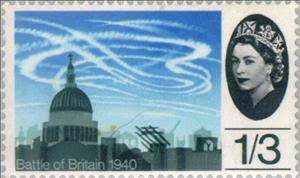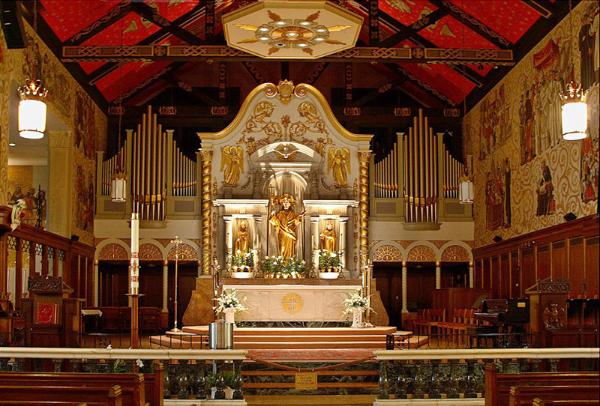Stamp: Air-battle over St Paul's Cathedral (phosphor) (United Kingdom of Great Britain & Northern Ireland 1965)
Air-battle over St Paul's Cathedral (phosphor) (United Kingdom of Great Britain & Northern Ireland 1965)
13 September (United Kingdom of Great Britain & Northern Ireland ) within release Battle of Britain goes into circulation Stamp Air-battle over St Paul's Cathedral (phosphor) face value 1'3 British shilling
| Stamp Air-battle over St Paul's Cathedral (phosphor) in catalogues | |
|---|---|
| Michel: | Mi:GB 401y |
| Yvert et Tellier: | Yt:GB 414A |
| Stanley Gibbons: | Sg:GB 678p |
| AFA number: | AFA:GB 395D |
Stamp is horizontal format.
Three phosphor bandsAlso in the issue Battle of Britain:
- Stamp - Flight of Supermarine Spitfires face value 4;
- Stamp - Flight of Supermarine Spitfires (phosphor) face value 4;
- Stamp - Pilot in Hawker Hurricane Mk I face value 4;
- Stamp - Pilot in Hawker Hurricane Mk I (phosphor) face value 4;
- Stamp - Wingtips of Spitfire and Messerschmitt face value 4;
- Stamp - Wingtips of Spitfire and Messerschmitt (phosphor) face value 4;
- Stamp - Spitfire attacking Heinkel bomber face value 4;
- Stamp - Spitfire attacking Heinkel Bomber (phosphor) face value 4;
- Stamp - Spitfire attacking Junkers "Stuka" Dive-bomber face value 4;
- Stamp - Spitfire attacking Junkers "Stuka" Dive-bomber (phosphor) face value 4;
- Stamp - Hawker over Wreck of Dornier Bomber face value 4;
- Stamp - Hawker over Wreck of Dornier Bomber (phosphor) face value 4;
- Stamp - Anti-aircraft Artillery in Action face value 9;
- Stamp - Anti-aircraft Artillery in Action (phosphor) face value 9;
- Stamp - Air-battle over St. Paul's Cathedral face value 1'3;
- Stamp - Air-battle over St Paul's Cathedral (phosphor) face value 1'3;
- Se-tenant - 25th Anniversary of the Battle of Britain (phosphor) face value 4*6;
- Se-tenant - Battle of Britain face value 6*4;
- Stamp - Hawker over Wreck of Dornier Bomber face value 4;
Stamp Air-battle over St Paul's Cathedral (phosphor) it reflects the thematic directions:
Commemorations are a type of religious observance in the many Churches of the Anglican Communion, including the Church of England. They are the least significant type of observance, the others being Principal Feasts, Principal Holy Days, Festivals, and Lesser Festivals. Whereas Principal Feasts must be celebrated, it is not obligatory to observe Commemorations. They are always attached to a calendar date, and are not observed if they fall on a Sunday, in Holy Week, or in Easter Week. In Common Worship Commemorations are not provided with collects or indications of liturgical colour. However, they may be celebrated as Lesser Festivals if local pastoral conditions suggest it.
A church building, often simply called a church, is a building used for Christian religious activities, particularly worship services. The term in its architectural sense is most often used by Christians to refer to their religious buildings, but it is sometimes used (by analogy) for buildings of other religions. In traditional Christian architecture, the church is often arranged in the shape of a Christian cross. When viewed from plan view the longest part of a cross is represented by the aisle and the junction of the cross is located at the altar area. Towers or domes are often added with the intention of directing the eye of the viewer towards the heavens and inspiring church visitors. Modern church buildings have a variety of architectural styles and layouts; many buildings that were designed for other purposes have now been converted for church use; and, similarly, many original church buildings have been put to other uses. The earliest identified Christian church was a house church founded between 233 and 256. During the 11th through 14th centuries, a wave of building of cathedrals and smaller parish churches occurred across Western Europe. A cathedral is a church, usually Roman Catholic, Anglican, Oriental Orthodox or Eastern Orthodox, housing the seat of a bishop.
An anniversary is the date on which an event took place or an institution was founded in a previous year, and may also refer to the commemoration or celebration of that event. For example, the first event is the initial occurrence or, if planned, the inaugural of the event. One year later would be the first anniversary of that event. The word was first used for Catholic feasts to commemorate saints. Most countries celebrate national anniversaries, typically called national days. These could be the date of independence of the nation or the adoption of a new constitution or form of government. The important dates in a sitting monarch's reign may also be commemorated, an event often referred to as a "Jubilee".



